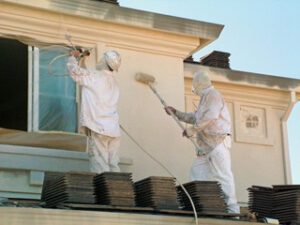House painters are in high demand. Many homeowners choose to hire professionals for the convenience, peace of mind and high-quality results.

House painters often run small businesses with 1-5 employees. They usually have valid insurance, customer testimonials/references and pictures of past projects. Many house painters also offer free estimates. Contact Above And Beyond Painting for professional help.
Professional house painters are dedicated to providing a high-quality finish that stands the test of time. They use premium-quality materials and proven techniques to ensure uniform coverage, smooth finishes, and precise detailing. They can save homeowners money in the long run by preventing costly mistakes that require rework and repairs.
House painters usually work on a commission basis and charge based on the size of the home, the type of paint used, and the amount of prep-work required. They will also quote a price for any additional services you may request, such as touch-ups or drywall repairs. It is a good idea to get quotes from multiple painters to make sure you are receiving competitive prices.
Some painters are one-man shows that operate out of their own homes and operate largely off word-of-mouth referrals. These individuals can be very inexpensive, but they are generally not insured or qualified to do an entire house painting job. Other painters are small companies with a few employees and are more established than the Mom-and-Pop shop. These companies are more likely to be insured, have customer testimonials and references, and will take your project a bit more seriously than the one-man-shows.
Depending on the job, some preparation work may be needed, such as removing dated popcorn ceilings or cleaning moldy or mildew-stained drywall. This is another cost that can add up quickly. Additionally, protective measures for furnishings and flooring during the painting process can add to the overall price as well.
If you have any specific requests, such as a mural or trompe l’oeil painting, these can also be very expensive. It’s a good idea to have these costs outlined in your initial estimate so you can factor them into your budget.
Peace of Mind
When you hire house painters, you can rest assured that the project will be completed in a timely manner. They will also take care to protect your furniture, carpets, and other items in the area they’re working, and clean up any paint or debris as they go.
Quality Paint
Legitimate house painters prioritize client satisfaction, so they will use high-quality paints that enhance the appearance of your home and stand up to weathering and sun exposure. If you’re shopping for a contractor, ask about the types of paint they offer and why they recommend certain options over others.
Identifying Inferior Paint
In some cases, dishonest house painters will use inferior paint to cut costs and boost profits. This can lead to a disappointing final product, including poor color distribution or lack of coverage and premature fading or peeling.
Recognizing this type of deception is easy if you know what to look for. Ask your contractor about the paint brand and grade they plan to use for your project, and be sure to request a clear breakdown of any additional fees or charges.
Seeking Transparency
Another common tactic is the bait-and-switch strategy, in which house painters present you with a highly attractive deal featuring premium services and materials at a seemingly unbeatable price. Ideally, you’ll be able to work with house painters who are willing to conduct a thorough pre-painting inspection and provide transparent assessments of your property’s condition.
Finally, reputable house painters will include detailed terms and conditions in their contracts, as this protects both parties. In addition, it will help to prevent miscommunications that may result in payment disputes or legal action down the road.
Time-Saving
Painting your home is a great way to add both style and value. But it’s not just about the aesthetics; it’s also a practical improvement that can save you money and time in the long run. For example, a fresh coat of paint can protect your home from weather and other elements that could damage it over time. A quality exterior paint job can also increase the lifespan of your siding and other materials.
While it may seem like an easy job, house painting requires specialized skills and equipment to ensure the best results. A professional will take the time to understand your preferences and apply the appropriate techniques, such as taping off walls or using a high-quality sprayer. They can also provide advice on color choices and finishes that will complement your home’s architecture and furnishings.
A good house painter will clean up after themselves and stay out of your personal space while they work. However, it’s still a good idea to plan ahead and remove anything you don’t want to risk getting paint on. And if you have any pets, make arrangements for them to be elsewhere for the day.
It’s important to get quotes from several painters before making a decision. Having a clear idea of what you need done can help you save money by choosing a painter that offers a quote specific to your needs. Indirect costs, such as the monthly payment for a work truck and overhead expenses, are also factors to consider. However, a good house painter will be up-front about these additional costs and make it clear what they include in their pricing. They’ll also be able to recommend quality products that will last longer and look better.
High-Quality Materials
Investing in quality painting materials is critical to achieving a high-quality paint job. House painters understand the transformative power of a fresh coat of paint, and they use top-grade products to ensure your project comes out beautifully. In addition to high-quality paints, professional painters also use essential tools and equipment for better results. These include safety equipment, cleaning supplies for before and after painting, a paintbrush or paint roller, caulk and a caulking gun, fine grit sandpaper, and canvas drop cloths.
There are many different types of brushes and rollers to choose from, so make sure you buy high-quality ones. Look for brushes with synthetic or natural bristles that are compatible with your paint of choice. Then, select a brush size based on the surface you’re painting. A small brush is ideal for trim, while a larger one works best for walls and ceilings. Finally, purchase a roller extension to help you reach tall areas like the ceiling.
A high-quality paint sprayer is also worth the investment. It makes it much easier to cover large surfaces and ensures a smooth, even finish. Plus, it saves time and reduces the amount of paint used, which is good for your wallet and the environment.
As the housing market continues to evolve, so do residential painting trends and technologies. For example, augmented reality apps offer homeowners the ability to see how various colors will appear on their walls before making a final commitment. Other innovations in the industry include self-cleaning paints that repel dirt, grime, and stains. Additionally, temperature-responsive paints automatically adjust color based on the surrounding environment. These technologies offer a more modern and vibrant aesthetic that is sure to impress.
Expert Advice
Hiring a house painter is one of the best decisions you can make to improve the look and value of your home. These professionals are seasoned, and know all the tricks of the trade to provide you with a professional finish. They can advise you on the best colors and finishes to complement your home, as well as how to prepare the surfaces before painting.
For example, painters often recommend using a primer on the bare wood to promote adhesion. Those who know how to do this correctly can ensure the new coat of paint will last longer, without peeling or flaking. They will also be able to recommend the proper amount of caulking to fill any cracks. They can even advise you on the most efficient way to apply your coats of paint, such as starting from the top and working down to the bottom or vice versa.
Other advice may include the use of a stippling brush for ceilings to achieve a smooth, streak-free finish, and the importance of removing drapes and window treatments before painting begins. This prevents them from getting sprayed with paint, and makes it easier for you to clean up the messes that are inevitable during the painting process.
When choosing a house painter, be sure to ask for proof of insurance before they begin work. They should be happy to give you a copy of their liability and workers’ compensation insurance. This is important to protect yourself in the event that an accident occurs, or if an employee is injured on your property.
